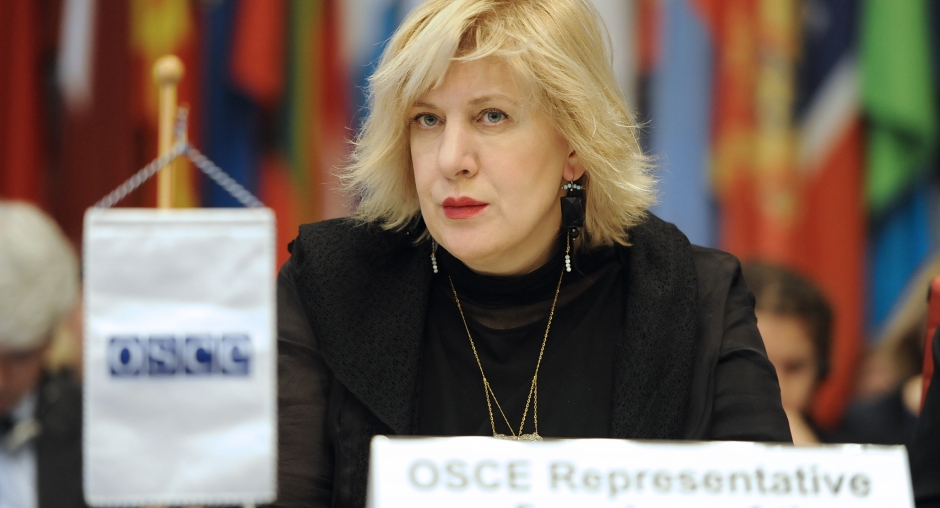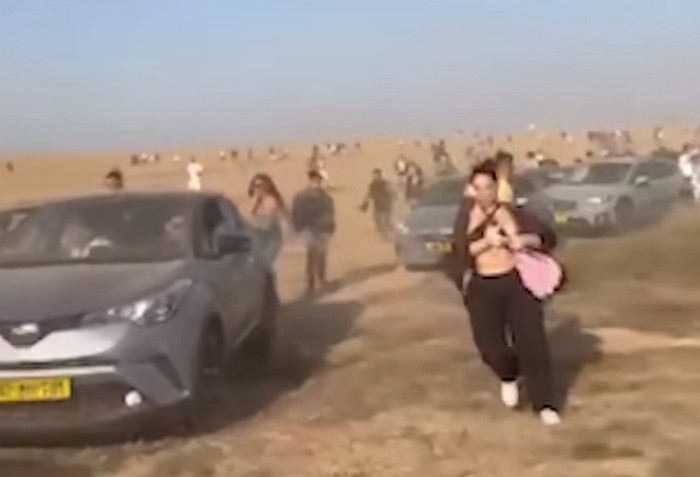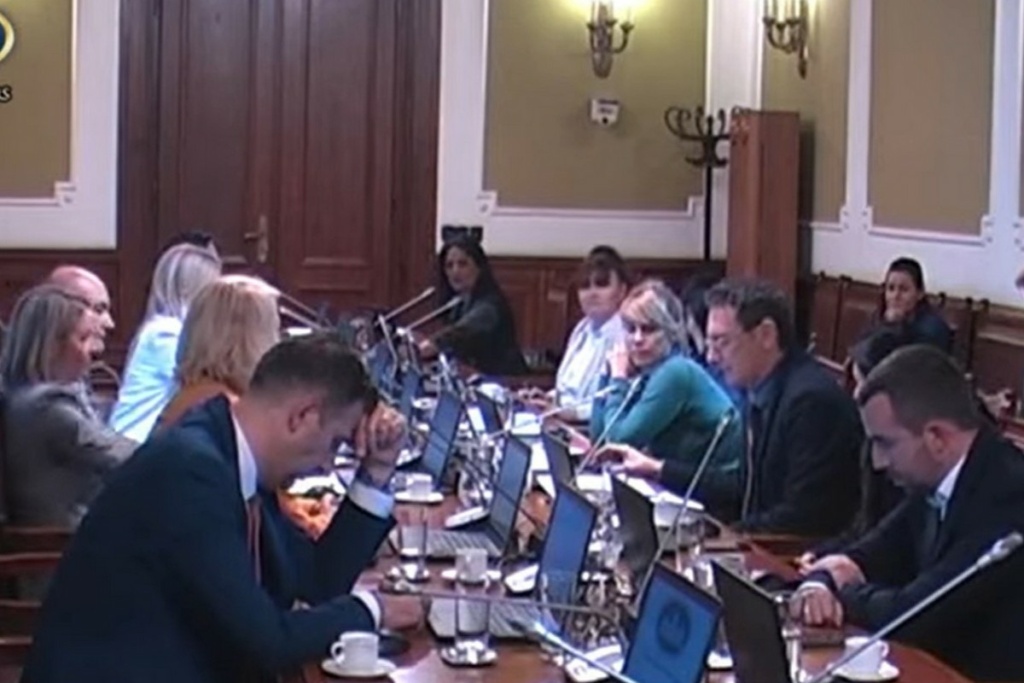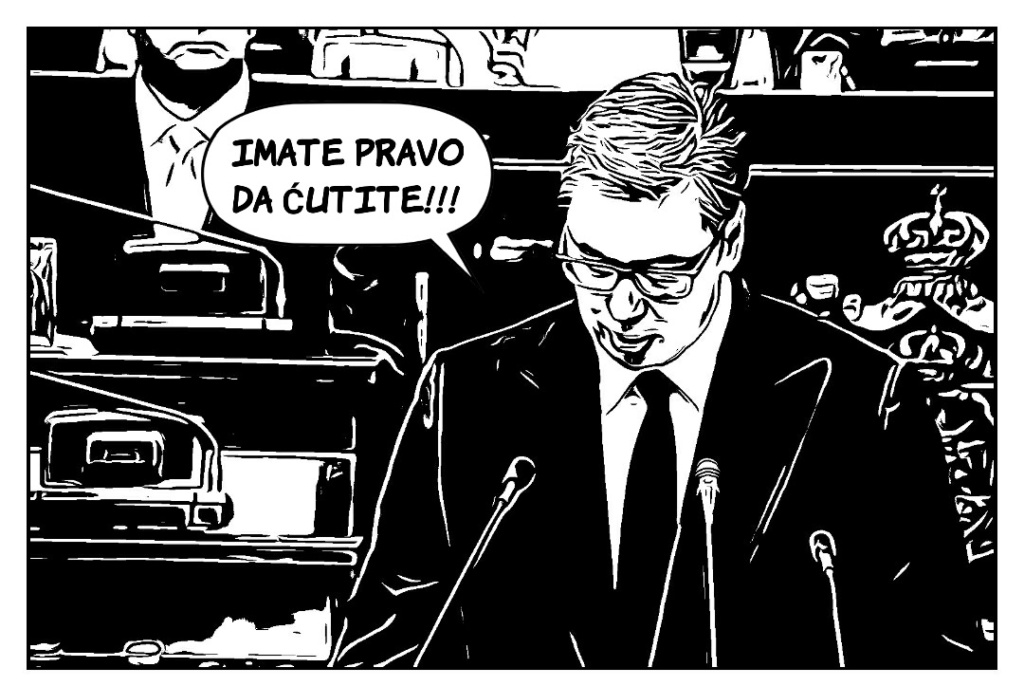 The OSCE Media Freedom Representative, Dunja Mijatović, welcomes the beginning of the trial for the murder of Slavko Ćuruvija and she expects the identity of the person responsible for his liquidation to be discovered
The OSCE Media Freedom Representative, Dunja Mijatović, welcomes the beginning of the trial for the murder of Slavko Ćuruvija and she expects the identity of the person responsible for his liquidation to be discovered
The Media Freedom Representative of the Organisation for Security and Coopeartion in Europe (OSCE), Dunja Mijatović, welcomes the beginning of the trial for the murder of the owner of “Dnevni Telegraf” and “Evropljanin” daily, Slavko Ćuruvija, and points out that her office shall be keeping an eye on everything concerning this trail as well as everything else happening around it. She also emphasizes that the trial is crucial for Serbia as well as the entire region and that she expects for the process to lead to the discovery of the masterminds, many of which in cases of murders of journalists around the Europe,from Russia and Turkey and all the way to Montenegro, have still remained unknown.
Cenzolovka: To what extent does the trial of those suspected for the murder of Slavko Ćuruvija pose an attempt of the government to deal with the relicts of the past and to what extent can it actually be a good sign for the future, in regards to the positive effect on the safety of journalists in Serbia?
The identity of the person who ordered the murder of Ćuruvija finally needs to be known, so that once again we can start breathing within the entire region. This is crucial both for the safety of journalists, for the quality of research as well as brave journalism. Those confronting the authorities cannot be deemed state enemies, but rather someone having a different opinion.
Mijatović: We need to be positive. The beginning of the trial is a good thing. I feel that the trial for the murder of Ćuruvija is not only important for Serbia, but is equally signifacant for the entire region. This is all due to the past and the manner in which Ćuruvija was murdered and everything else taking place since 1999 until today, at the time when this case was not investigated and was swept under the rug.
The Committee for the investigation of the journalists’ murders has done plenty in that sense. I know that there are those who feel that what the Committee has done is actually not good, but I disagree with them. The fact that this topic of violence against journalists is now present in the public, from the moment the Committee has started with its operation, is good enough. The problem is when one stops talking about it,and nothing is done.
Cenzolovka: The Committee is a non-constitutional body, so it only helps what the state should do….
Mijatović: Of course, the foundation of the Committee does not diminish the responsibility of the authorities to investigate this case, in any way. Neither does it diminish the responsibility of the courts and everyone else who should be involved in this process. The indictment poses a positive step, however, the results shall show whether we are right or not.
I have always been an optimist and I hope for good results. After all, this process should unstop some corks which have been clogged for a long time in Serbia, as well as the entire region, regarding the things which took place in the past.
Only a true, real and transparent investigation of the case of the murder of Slavko Ćuruvija can point to such things which shall no longer be tolerated nor repeated again. One finally has to know who has ordered the murder of Slavko Ćuruvija, so that we can start breathing in the entire region. This is important both for the safety of journalists, as well as for the quality of research and brave journalism. Those confronting the authorities may no longer be deemed public enemies, but rather those who have a different opinon.
I feel that everything that is currently taking place in Serbia, has a strong impact on the entire region, due to the fact that Serbia is a large country and is currently in focus of the international community.All positive shall be accepted in the entire region, which, as far as journalism is concerned, is also in a catastrophic situation.
Cenzolovka: Will you be following this trial?
Mijatović: I will be watching and following. I do understand how after so many years one can hardly believe that something positive would happen, but I do believe that this trial is extremely important. It is also very important to ensure that this trial is closely followed as well as everything else happening in connection to it, seeing it unfold and whether it will be open to public…
Should the trial lead to the truth and we finally find out how it all happend, why was Ćuruvija murdered and who ordered his murder, the state institutions in Serbia would then gain enormous credibility. Serbia would then be recognised as a state facing its painful and sensitive events.
Cenzolovka: Do you expect for the efficiency that the Committee has displayed, to be carried on in state institutions as well?
Mijatović: I belive that the state institutions in Serbia may no longer afford the luxury of having this case swept under the rug. The Committee in this case has done as much as the mandate allowed. It may not get invovled in the operation of the judicial system.
It would be unprofessional of me to either say that the government will do nothing about it or that I am sure it would do everything possible. Now that the charges have been brought, the turning point shall be to see in what manner shall the state do it.
I repeat, now that the trial has been initiated, there is no turning back for Serbia.
Cenzolovka: How do you comment on the fact that 16 years after the murder and after so many investigations, the masterminds of the murder of Ćuruvija are not on trial?
Mijatović: Not only do I react in the case of the murder of Ćuruvija, but I also react in all other cases of unresolved journalists’ murders. From Russia, Azerbaijan, Montenegro and Turkey…. I insist on discovering the masterminds in all cases where they are still unknown.
I have no knowledge of this, but I do what I can: I constantly talk about it in the public, not wanting for it to be forgotten. The public in Serbia does talk about Ćuruvija, and it has been doing so for quite some time know, which I feel is good. However, should people stop talking about it, it would not be good, but then, there are institutions, such as mine is, to react and to remind.
I do understand why after so many years, one can hardly believe something positive will happen, but I feel that this trial is extremely important. It is also very important to ensure that this trial is closely followed as well as everything else happening in connection to it, seeing it unfold and whether it will be open to the public…
It’s a shame that this is the case, but then again, it is crucial that all this disappointment in the system’s institutions does not lead to a burnout of the journalists’ associations, the civil society and the citizens, who should be demanding the investigation of all forms of violence.
Cenzolovka: The role of the state in the case of the murder of Ćuruvija is obvious. Is it possible that the state would start functioning normally should it lack the strength to face the crimes it has committed, both in the case of journalists’ murders and war crimes as well?
Mijatović: The state has to face this. I do agree that this should not only be done in the case of journalists’ murders, but also in relation to everything that has taken place in these regions for the last 25 years. Each case should be considered with the inclusion of all state institutions. All that has taken place in these regions is either directly or indirectly in connection to the murder of Ćuruvija.
One may like it or not, but is should be acknowledged that this government has decided to face this crime. This is how the international community perceives it and how it is perceived in the region, and among some of the people in Serbia.
At the same time, it is important to wait and see what shall be done, so that we can either welcome it or criticize it.
I sincerely hope that those responsible shall be indicted, for the sake of Ćuruvija’s family and his fellow journalists and the future of journalism in Serbia and the region.
Cenzolovka: Last year in Serbia, both at the time of the floods and before them, there have been cases of censorship, and you have warned the Government of this. What are the consequences? Has the Govrenment done something to embrace the objections OSCE has made?
Whether you like it or not, one has to acknowledge the fact that this government has decided to face this crime.
Mijatović: At that time, I had several meetings with Minister Tasovac and his team, which the Government has appointed to provide the information regarding the cases I then stated. There have been many other cases that the public was not aware of.
As far as I can see it, the Government has taken an active role in the investigation of all of these cases, among which are the hacking attacks on websites. Various institutions are involved, given that it is a complex problem. The Ministry of Culture has initiated this process which should help strengthen the website safety, and a meeting with online media representatives has recently been held. Nevertheless, it seems that websites are not secured enough, not only in Serbia but in the entire region as well.
The point directed at the Govrenment is that, above all, they should be the ones doing something for it to stop. I did not say that the govrnment is doing it, nor Vučić or any other institution for that matter. I don’t know, I didn’t have any evidence of it. I only had evidence of websites crashing and texts being removed and I have singled out those responsible, in which case this is the Government and the state institutions.
I have told the Prime Minister that he should provide the evidence, not me. The state institutions are the ones that should investigate, the Ministry of Interior, units in charge of this, the Telekom….
This does not solve all the problems, but I do feel that an amount of awarness has been raised that something does need to be done about it.
Cenzolovka: Is it too late? You have mentioned the Conference on the Safety o Online Media, organised by the Ministry of Culture and Information, held in March this year, and these website attacks have taken place beginning and mid 2014.
Mijatović: The important thing is that something is being done. Even six months later is still good, given the state of journalism in the entire region. It is not over yet, and we are yet to see the results.
At the same time, each positive step should be welcomed. My role is not to be malicious. I am straightforward with them, nothing is being done behind the scenes and all I want is to help the journalists. I’ve been doing it all my life. At the same time, I ask the government for honesty and transparency. We may disagree, but that does not mean we are on different sides and we do welcome each and every positive step. I feel that all that is happening in Serbia has an impact on the entire region, given that a large state is at stake and that it is currently in the focus of the international community. All that is positive shall be accepted in the entire region. Each positive step made in Serbia shall help me as well when working in Bosnia and Herzegovina, in Albania, Montenegro and Macedonia…. states, which is as far as journalism is concerned, are in a catastrophic position.
Cenzolovka: Serbia has regressed as far as media freedom is concerned, judging by the last report of the Reporters without Borders.
Mijatović: I regularly read the reports of both the Freedom House and the Reporters without Borders, with whom I have an excellent cooperation, and it is important for me to see how they rank. The way I see it, however, is different – I taken action when I see a problem, I do not rank states. Such ranking would be a mission impossible, opening the Pandora’s box.
It is important that Serbia is willing to come to grips with certain things, which are both painful and sensitive for any society. In that process, I, being the media freedom representative on behalf of OSCE,and after all, being someone from this region,shall be of the greatest help possible to all those people involved in journalism and civil society.
I have also met up with Brankica Stanković and some other journalists who are under a threat due to what they do. I wish to support the process which would lead to media freedom and journalists’ safety, but I shall also be the first who would condemn such attacks and manipulation of people who are in journalism.
Cenzolovka: Serbia is currently undergoing a process of media reform, privatization and digitalization. On the one hand we have the laws, which could be good and on the other hand there is the problem of applying them. Is OSCE monitoring this process? Can it influence the process so that this process which is supposed to lead to the strengthening of media pluralism is not driven to another extreme and further diminishes the freedom which has already been infringed?
Mijatović: As far as the media regulation and the laws are concerned, those that Serbia has adopted, I feel that a huge step has been made. Both Minister Tasovac and his team have greatly contributed to this. I know that there are those who object to this law. I have talked to the people from the public service in regards to certain provisions which I am not comfortable with. The people from the Regulatory agency as well…
It is however, impossible, for everyone to be satisfied. I do not know of a state that is not faced with problems during the implementation of a law, especially a state going through a transition.
Digitalization is probably the biggest challenge for the media, not only in the region, but worldwide as well. Especially in states that are poor and lack the sufficient funds for the provision of pluralism and protection of local media, moreover in rural areas. One of the crucial aims during my mandate is the preservation of media pluralism.
Cenzolovka: There are also numerous problems in the process of media project financing.
Mijatović: At the same time, Serbia has come to grips with huge problems. This did come about late, but it has still not been done in Bosnia and Herzegovina and many other countries. There are still those minor media, which have been dying out in the past 20 years, which have not been privatized.
Mora se naći način da se pomogne ljudima da ne ostanu bez posla i na ulici, a da se istovremeno mediji privatizuju na najbolji mogući način, jer je nemoguće da se drugačije održe na sve manjem tržištu.
A way must be found to help the people keep their jobs, and at the same time the media should be privatized in the best manner possible. Otherwise, they will not be able to survive on the market that is constantly getting smaller.
The entire Europe is facing these problems. Not only the countries going through a transition, but also those in the European Union are dealing with serious issues when transferring to the digital signal and trying to preserve pluralism. Several international organizations should deal with this simultaneously.
Cenzolovka: In the past several months, Cenzolovka has investigated cases of pressure being placed on journalists in various editorial offices and they have often proven to be – extreme. Such pressure comes from politicians in power, and there are also financial pressures. Journalists are faced with censorship of their texts by the editors and autocensorship as well, given that each editorial office knows in advance what and who should not be critically written about. How can journalists come into grips with these problems and retrieve their profession the dignity it lacks?
Mijatović: I have talked to journalists about this. Such problems are best resolved through solidarity among journalists who wish to protect the dignity of their profession. One of the greatest problems which I often encounter in this region is the disarray within the profession, journalists not talking to each other, agreeing to be the spokesperson of a politician… They do it for various reasons, some for economic reasons, and some because it is easier for them. The profession is the one suffering in this process, independence as well. The research journalism can only be found in traces in the entire region, and so many trainings and donations have been provided since the war stopped.
Photo: OSCE


 Saragusti: Niko sada nije bezbedan. Zločini su jezivi. Novinari su ubijeni dok obavljaju svoj posao
Saragusti: Niko sada nije bezbedan. Zločini su jezivi. Novinari su ubijeni dok obavljaju svoj posao Medijski amandmani umiru u skupštinskom mraku: Noćno zasedanje Odbora, u četiri čina
Medijski amandmani umiru u skupštinskom mraku: Noćno zasedanje Odbora, u četiri čina Snaga dobre priče: O mitologiji medija
Snaga dobre priče: O mitologiji medija
Ostavljanje komentara je privremeno obustavljeno iz tehničkih razloga. Hvala na razumevanju.